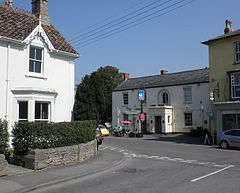Wedmore
| Wedmore | |
|---|---|
 The centre of Wedmore |
|
| Wedmore shown within Somerset | |
| Population | 3,318 (2011) |
| OS grid reference | ST4347 |
| Civil parish |
|
| District | |
| Shire county | |
| Region | |
| Country | England |
| Sovereign state | United Kingdom |
| Post town | WEDMORE |
| Postcode district | BS28 |
| Postcode district | BA5 |
| Dialling code | 01934 |
| Police | Avon and Somerset |
| Fire | Devon and Somerset |
| Ambulance | South Western |
| EU Parliament | South West England |
| UK Parliament | |
Wedmore is a village and civil parish in the county of Somerset, England. It is situated on raised ground, in the Somerset Levels between the River Axe and River Brue, often called the Isle of Wedmore. It forms part of Sedgemoor district. The parish consists of three main villages: Wedmore, Blackford and Theale, with 14 hamlets including Bagley, Cocklake, Mudgley, Panborough and Sand. Wedmore has a population of 3,318 according to the 2011 census.
Its facilities include a medical and dental practice, pharmacy, butcher's, a village store with off licence, three pubs, restaurant, café and several other local shops. It is located 4 miles (6 km) south of Cheddar, 7 miles (11 km) west of the city of Wells and 7 miles (11 km) north west of Glastonbury.
Iron Age remains have been found in the area, and there are a number of Roman sites in the district.
The name Wedmore in Old English probably means hunting lodge and there was a Saxon royal estate in the area. Centwine gained control of the area in 682 and named it 'Vadomaer' after one of the Saxon leaders Vado the famous. After winning the Battle of Ethandun, Alfred the Great caused the Viking leader Guthrum and his followers to be baptised at Aller and then celebrated at Wedmore. After this the Vikings withdrew to East Anglia.
The Treaty of Wedmore is a term used by historians for an event referred to by the monk Asser in his Life of Alfred, outlining how in 878 the Viking leader Guthrum accepted Alfred the Great as his adoptive father. No such treaty still exists but there is a document that is not specifically linked to Wedmore that is a Treaty of Alfred and Guthrum. Alfred then left Wedmore to his son Edward the Elder.
...
Wikipedia

